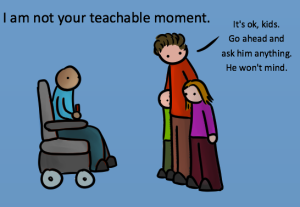
Source: BET
I spend a lot of time thinking about parties.
Not only do I love parties, but a big part of my work is encouraging sex-positive party culture on college campuses.
And while I love to party, I have to remember something: Parties can be profoundly dangerous places, especially for women.
So it leaves me wondering this: Aside from the environmental changes we can make to ensure party culture is more sex positive, in what ways can men act as allies to women at parties, particularly as we look to prevent sexual violence?
Whether you’re in the club or at a house party or a school-sponsored dance, men have a responsibility to act in solidarity with women to ensure that parties are fun and safe for everyone.
When it comes to party environments, though, that’s not exactly simple to accomplish.
After all, attempting to be a good ally to women can quickly devolve into some paternalistic “white knighting” that can easily recreate the very systems of power and marginalization and oppression that we’re looking to undermine.
And as I sat down to write this piece, it ended up being a lot more difficult than I thought. Every idea I came up with for how to be a good ally at parties seemed to easily devolve into paternalistic ugliness.
So I reached out to my community!
And once again, I was reminded about how this work must be done in cooperation.
In turn, the following list is reflective of my community: friends, acquaintances, other bloggers, family members.
While some ideas are my own, many, even ones not directly attributed, are reflective of the powerful community in which I am fortunate to be grounded in my work to prevent sexual violence on college campuses.
1. Don’t Be ‘That Guy’
Arguably the most important thing that a man can do to act in solidarity with women in party atmospheres is to make sure you aren’t being the one to make others uncomfortable (at best) or to act predatorily (at worst).
What I often say is that men who openly espouse feminist ideals and who know how to “talk the talk” of solidarity are sometimes the most dangerous to women.
After all, those of us who can drop some bell hooks or speak to the performative nature of gender roles have the potential to gain trust and to exploit that trust to manipulate, assault, or otherwise hurt women.
In short, if we want to be allies, we have the most responsibility to buck our social conditioning of what it means to be a man.
We have the responsibility to consider the impacts of our actions on the women around us, even if we are not intending to make them uncomfortable.
In the words of my friend Jen, “If you comment on a person’s appearance, be aware it could be unwanted attention and make her uncomfortable (especially in alone situations or when it turns into harassment). Don’t jump to calling her pet names (sweetheart, babe) or to making requests of her (smile for me, etc).”
In short, don’t be that guy – the guy who actively is hitting on everyone, who is ogling women’s bodies, who’s enabling other men to prey on women, who is performing traditional, toxic masculinity.
2. Don’t Be Paternalistic
One of the trickiest aspects of attempting to ally oneself to women as a man in any context is avoiding paternalism – acting on behalf of women as if we know better than them – but it’s particularly tough to avoid in party environments.
After all, parties tend to be loud, busy, complicated, and people are there for a variety of reasons.
Thus, we might see a woman on the dance floor who has someone grinding up on her. Even if she has a look on her face that we interpret as discomfort, it’s hard to know how to proceed.
After all, maybe that is how her face looks when she’s really into something! Or maybe she is uncomfortable, but doesn’t want help from a stranger. Or maybe she is uncomfortable and wants help, but not from a male-identified person. Or maybe she’s getting ready to handle it herself.
The key here is not to assume we can “save the day” and to be respectful and defer to women when possible.
If you have a relationship with the women in question, a simple check-in can go a long way: “Hey! How you doing? Wanna get a drink with me?”
If you don’t know the person in question, sometimes even making eye contact and giving a concerned look can allow her to signal whether she might want your help.
From there, perhaps the best way to proceed is to engage the guy who’s acting inappropriately.
Talk to him, distract him, and if she’s uncomfortable, she can move along. Doing so helps share the agency, allowing her to still make a decision about how things should go forward.
Perhaps, though, the best way to be an ally is, as my bestie Becca put it, to consider “how you position yourself in a room/situation. Sometimes removing yourself from a room/situation altogether can be a form of allyship in itself.”
In a party environment, sometimes the best thing we can do to avoid paternalism is to be aware of the space we are occupying in parties and consider how we’re interacting with women and act accordingly, which may mean removing ourselves from a situation.
After all, offering a woman a ride home (even with good intentions) could be the most threatening thing she’s experienced all night.
Lastly, recognize that when you try to be an ally, sometimes you’re going to screw up and totally “white knight” the situation.
If that happens, apologize where necessary and try to learn from that experience.
3. Err on the Side of Intervention
At the same time, and to complicate number two more, one of the most common sentiments expressed by women I asked about how to be a good ally at parties was to err on the side of intervention.
In the words of my friend Jessica, “If a situation doesn’t seem safe, it probably isn’t.”
Jessica, is a survivor of sexual violence who was in a situation where two of her guy friends likely could have intervened to prevent her assault, but didn’t for fear of overstepping their bounds. Sadly, this happens too often.
Thus, there are ways to intervene that avoid paternalism.
If you have a relationship with someone and are concerned about their safety, ask them.
Sometimes this can be overt: “Are you cool? Do you want him to do that?” or even just “Are you okay?” (as suggested by my friend Juliana).
Sometimes this can be subtle, stepping in and saying, “Oh, finally found you! Want to dance/get a drink/go outside?” This can allow a break where you can check in.
Additionally, if you see someone of any gender taking away someone who is totally wasted, check in and see if you can help get them to bed safely, and ensure that they go to bed alone.
Doing so might mean making sure they leave with their group of friends, or it might mean helping them home yourself.
The risk of paternalism here can be high, but I’ve heard over and over that if done respectfully, a check-in or bystander intervention is one of the more important tools we have in preventing sexual assault.
4. Be an Example of Consent
Have you noticed how few examples we have of a positive, enthusiastic consent ethic in our social spaces?
You can change that! Demonstrate consent in all things you do.
Ask for consent on the dance floor before grinding against someone or touching them. Ask if you can kiss someone. If people you know are touching other people’s bodies without consent, remind them that consent is vital.
And, in the words of my friend Ben, “Wear consent swag! ‘Consent is sexy’ being publicly displayed is always good.”
5. Allow People to Pour/Get Their Own Drinks
We may feel like we’re just being polite by asking to get someone else a drink, but there’s a sad reality that buying drinks for someone else is a predatory tool used by rapists.
Either they drop something in someone’s drink, get a double and tell someone it’s a single, or simply ensure someone loses track of the number of drinks they’ve had.
A simple thing we can do in parties is to forget the chivalry and help create a culture where everyone controls their own drinks.
Rather than “Can I get you a drink?” we can say, “Want to go get a drink with me?”
6. Encourage Conversation, and Make Sure All People Are Included
Let’s face it: Men are socialized to dominate conversations and place ourselves as the center of attention. I’ve even heard shy guys talk about how they wish they could do it easier so they will be more attractive.
But this has a great cost.
In their research on college party culture, A. Ayers Boswell and Joan Z. Spade stress atmospheric aspects of parties that encourage conversation as a way to humanize one another – a key to preventing sexual violence.
One of the things they note is that parties where men dominate most conversations are higher risk for leading to sexual violence.
Simply put, we as men can ensure that the space we occupy doesn’t exclude women or reinforce ideas that men must be dominant and in control, and we can ask men who dominate conversations or interrupt women to take a step back.
“Hold on, dude! What were you saying [directed at a woman who was interrupted]?” can go a long way.
7. Call Out Misogynistic/Sexist Language, Behavior, and Jokes
Another thing stressed in Boswell and Spade’s research is that tolerance at parties for jokes or language that degrades women is strongly correlated with sexual violence.
In turn, men who wish to be in solidarity with women must call out misogynistic jokes, language, and behavior (whether it takes place during a party or not).
That means that we have a responsibility to explain to other men that it’s unacceptable to:
- Talk in objectifying ways about women’s bodies
- Use language like b*tch, c*nt, p*ssy, sl*t, or the like
- Get handsy with women without consent
- Talk to women with the sole purpose of “getting laid” while ignoring women we don’t find attractive
- Make sexist jokes (only to hide behind the “comedic license” excuse)
And from my friend Kyra: One of the most important things we must keep in mind is to never participate in or tolerate slut shaming.
8. Forget ‘Bro Code’
“Bro code” – a list of rules that “bros” must abide by when dealing with other “bros” – varies depending on who you ask about it, but it all is pretty gross misogynistic.
I almost want to like Bro code, as it’s supposed to, in its essence, be about men taking care of other men, something that’s not practiced or discussed much in our society.
In practice, though, “bro code” ends up being a list of sexist and homophobic tropes such as:
- Thou shalt not sleep with your bro’s ex
- Thou shalt not cock block (ever – under any circumstance)
- Thou shalt not ever let your bro talk about Broadway musicals
- Thou shalt not get with your bro’s sister
(Yes, all of those are things I’ve heard other men say out loud.)
So let’s be clear: “Bro code” treats women as objects (best case scenario) or enables rape (at worst).
It needs to be abandoned.
In the words of my friend Danielle, “What we call ‘cock block’ means actually preventing rape.”
After all, what bro code produces is shit like what a few of the men in this video exhibit (note that one of the rape enablers is an off-duty police officer).
For a while I thought it might be possible that we could transform “bro code.” I had grand visions of “wing man” meaning a man who held another dude accountable for his behavior.
But after a tough discussion with my partner, who pointed out just how much “bro code” and the hookup-focus and sexism there is rooted in male sexual entitlement, I’m pretty sure it just needs to be abandoned.
Done.
Finished.
No more “bro code.”
‘Ally’ is Not a Noun
In short, those of us male-identified people who consider ourselves to be feminist or pro-feminist need to remember: Being an ally is not a noun. It is not a label that we simple get to carry around.
Being an ally is an action, and we have a responsibility to act to ensure that our social spaces are safer for everyone.
Inevitably it will be hard to be a good, accountable ally in a party environment. After all, you’re almost guaranteed to act as a paternalistic “white knight” without intending to.
But we have to be willing to walk that line in order to hold all men accountable in creating safe and inclusive social spaces.
The question is, then, what are you going to do to be an ally at the next party you attend?
[do_widget id=”text-101″]
Jamie Utt is a Contributing Writer at Everyday Feminism. He is the Founder and Director of Education at CivilSchools, a comprehensive bullying prevention program, a diversity and inclusion consultant, and sexual violence prevention educator based in Minneapolis, MN. He lives with his loving partner and his funtastic dog. He blogs weekly at Change from Within. Learn more about his work at his website here and follow him on Twitter @utt_jamie. Read his articles here and book him for speaking engagements here.
Search our 3000+ articles!
Read our articles about:
Our online racial justice training
Used by hundreds of universities, non-profits, and businesses.
Click to learn more




















